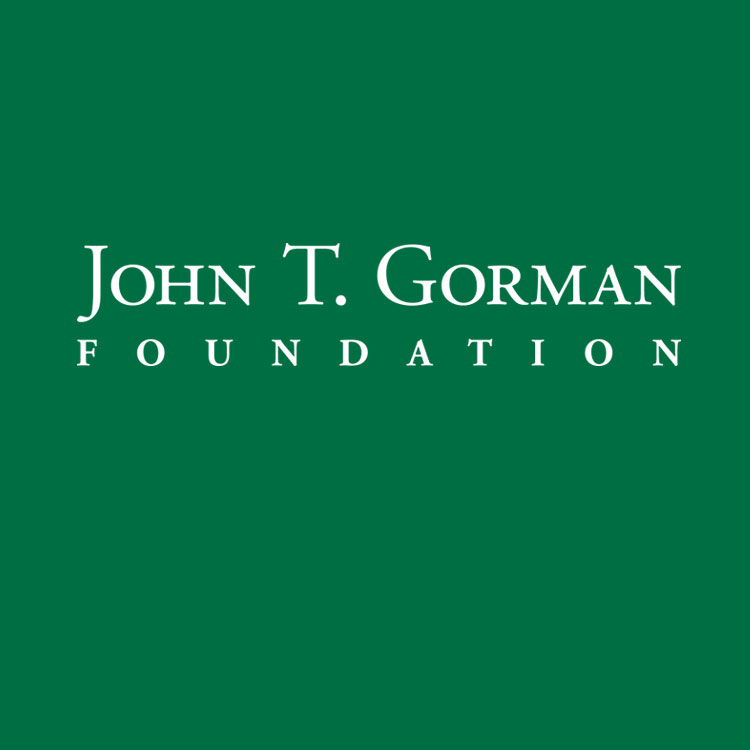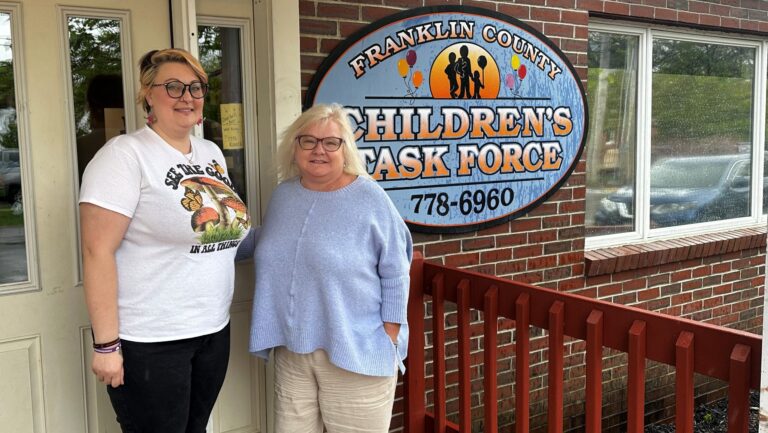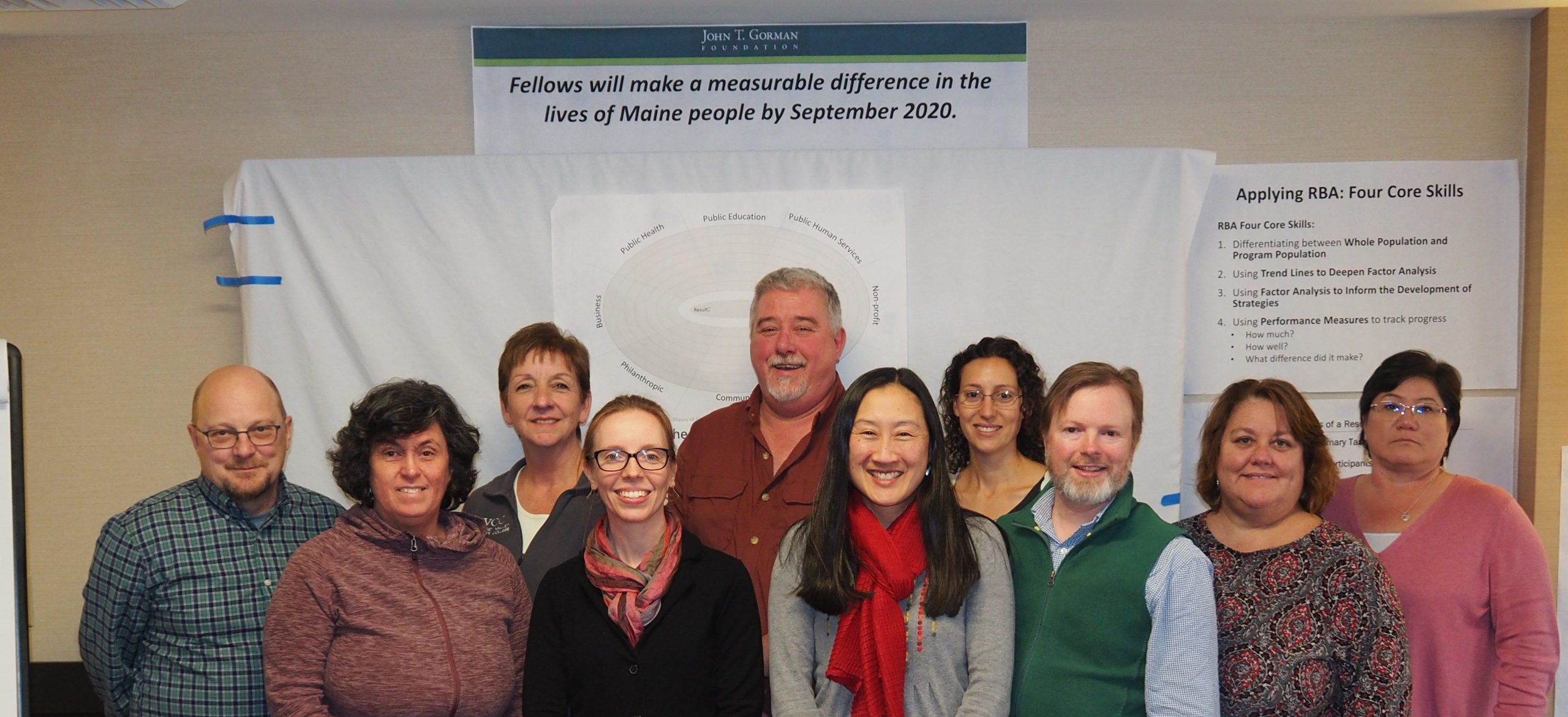
The 2019 John T. Gorman Fellows completed the final seminar of the Fellowship last November, capping off nine months of intensive work not only to learn the elements of Results Based Leadership, but to apply them in their work in real time. Over the course of the Fellowship, these established leaders identified their “result”– the ultimate outcome they are trying to achieve for economically disadvantaged Mainers – along with a set of targeted goals to reach along the way.
In what Fellowship co-faculty Raj Chawla called a “public conversation of accountability,” the Fellows made short presentations on the strategies they had implemented over the previous months, what progress they had made toward their result so far, and lessons they learned about what it means to be a “results-based leader.”
Their presentations drew stark portraits of the struggles vulnerable Mainers face and the systemic issues that contribute to those challenges. But they also shed light on what it will take to make lasting, significant improvements for Maine people and communities.
Cases for Action
Each Fellow began their presentation with a strong case for why action is needed.
“Outside my office is Kennedy Park, a gathering place for families who live in the downtown Lewiston area. And on a bright, warm day, you see these families alive with smiling faces and kids running around,” said Misty Parker, Economic Development Manager for the City of Lewiston. “What you don’t see is that these families have median incomes half that of the rest of the city. What you don’t see is that unemployment in this part of the city is twice that as in the rest of the city. When you can see the challenges faced by these families in an area of such concentrated poverty—at a time when we have increased investment, businesses expanding, and employers looking for people to fill jobs—we are doing something wrong.”
Parker’s work has been to increase workforce programs and childcare options to help residents take advantage of good-paying opportunities to provide for their families while bringing opportunity to a part of the city that has been denied it for decades.
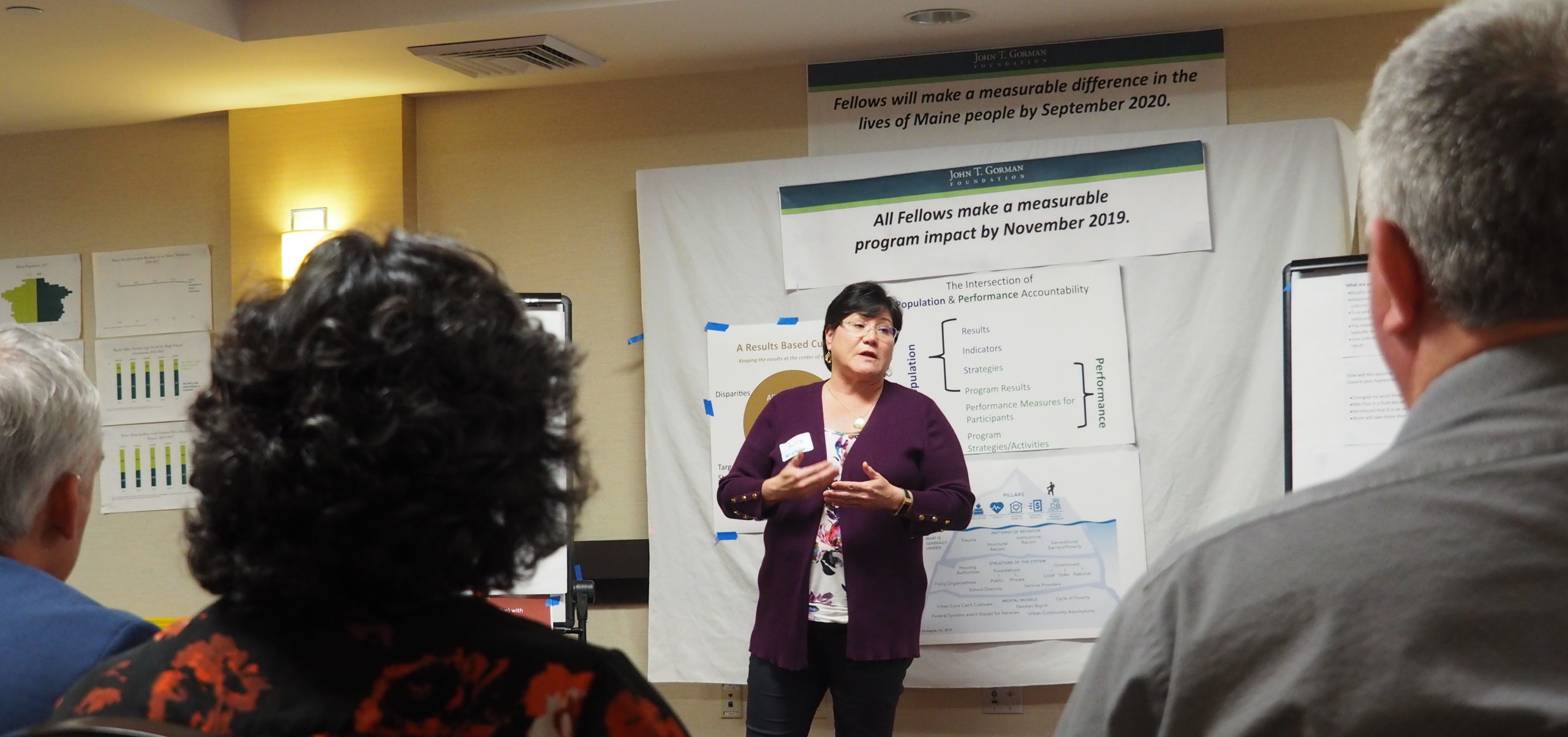
Liz Neptune of Wabanaki Aspirations spoke to the effects of longtime disenfranchisement on tribal communities in Maine. “Wabanaki people across Maine face incredible disparities,” she said. “Their health status mirrors that of a third-world country, more than 60 percent of the population makes less than $25,000 a year, and there is a low educational attainment rate across the board.” Starting with Indian Township, she is working with the tribal government on comprehensive efforts to improve education, economic, and health outcomes, with the goal of taking successful strategies to the four other Wabanaki communities.
Tara Williams, Executive Director of the Maine Alliance for the Education of Young Children, spelled out a problem facing many of Maine’s working families and the state overall—lack of access to quality childcare.
“We know the first years of a child’s life are ones of rapid brain development—these years lay the foundation for everything that comes after. Children and families in our state benefit when these early childhood years involve positive interactions with caregivers and enriching, effective early learning experiences,” Williams said. “We also know that 70% of Maine children have all available parents in the workforce, so most families need some sort of childcare or preschool program. For many of them, that’s just out of reach. There’s not one available in their area, it’s too expensive, or the one that they can find and afford may not have the quality of care needed to make a difference in their child’s life.” She is pursuing several strategies to support the professional development of childcare providers and push policy changes to increase access.
Data, Strategies, and Results
As these previous examples show, the Fellows are working to address complicated issues with a large scope. How did they choose where to start? The answer, in short, is data. Fellows gathered as much data as they could, then broke it into smaller pieces to find the largest contributors to negative trends. That way they could pinpoint their strategies to have the biggest impact toward their result.
Chris Bicknell, Executive Director of New Beginnings, a youth homeless shelterin Lewiston, is working toward a result of having all of Maine’s homeless youth be safe and cared for in their communities. To Bicknell, the data revealed the need to prioritize efforts to improve outcomes for youth of color his organization served.
“If you look at the trend line, you’ll see a 293% increase in youth of color being discharged to unstable and unsafe housing since 2014, and that’s completely unacceptable,” Bicknell said. Disproportionately negative outcomes for people of color was a common theme across issues for Fellows.
David Dorr, Director of Somerset Career and Technical Center, recounted how a cross-sector group formed to support youth in Somerset County focused on improving two data points – the graduation rate at Skowhegan Area High School and the percentage of local youth who felt valued in their community. The matching strategies were increasing pathways to graduation and implementing trauma-informed practices on campus.
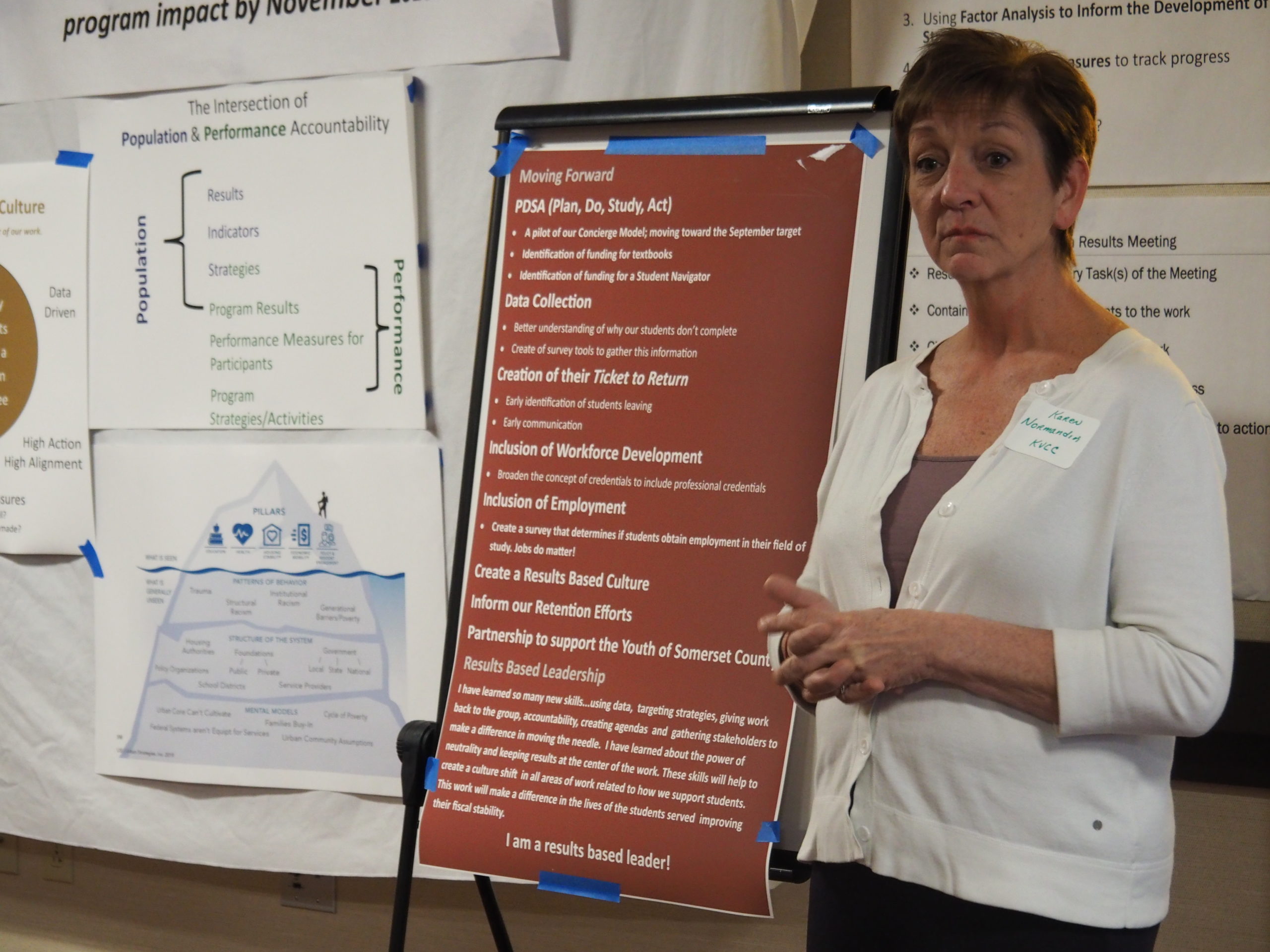
Also in Somerset County, Kennebec Valley Community College Vice President Karen Normandin is working toward a result of all community college students completing a certificate or associate’s degree. Her data analysis of students who left without a credential found that many had earned a significant number of credits—20 students, in fact, had enough for a degree in General Studies or Liberal Studies. Normandin led administrative changes to allow those students to get their degrees, and is advancing other efforts to support at-risk students who are close to completion.
Two Fellows—Portland Public Schools Director of Intervention Strategies Gail Cressey and Portland ConnectED Executive Director Matt Dubel—leveraged their positions to work toward a common result of “All Portland Students are successful in school.” Their strategies focused on improving reading proficiency for 3rd grade students, a critical predictor of future success, with a focus on low-income students. While Cressey focused on curriculum and in-school support, Dubel targeted summer program offerings to help prevent the summer slide. A district reading assessment this fall showed that they had met their targeted goal for progress.
Lessons Learned
Along with sharing their outcomes, Fellows also shared some lessons learned about Results-Based Leadership overall.
“What I’ve learned is the importance of moving from program thinking to results thinking,” said Janet Smith of New Ventures Maine, whose result is financial stability for all Maine families. “Like using data to create urgency for people, to be able to identify these targets and not to create a one-size fits all program, as well as promoting accountability to make sure that all partners are helping to move the needle and move things forward for low-income families.”
Kim Gustafson, Scholarship Director at the Mitchell Institute, echoed a finding of several Fellows—that they can’t do it alone. Results Based Leadership means aligning the contributions of other organizations and individuals toward a common goal.
“By utilizing the data, we were really able to zoom in on what we needed to prioritize—financial resources, food security, and healthcare all emerged over and over again,” she said of efforts to support the success of Mitchell Scholars, many of whom are first-generation college students from low-income families. “It reinforced the idea that even though we’re in the business of supporting access to education, there’s so much more these students need to be successful. So that’s where the aligned contributions come in. There’s no one organization that can do it all.”
This lesson will be especially important over the next few months as Fellows apply what they have learned on a larger scale—moving beyond their own organizations to include broader partnerships with the intent of making a population-level impact. They will share their progress next fall, and we look forward to what this incredible group of leaders will have to share.
Interested in applying to the John T. Gorman Fellowship? We expect to announce application dates for the 2021 Fellowship class in late spring. Contact Lauralee Raymond for more information.

